Diamond CEO Steve Geppi was the guest for two hours on Dan Shahin’s Comic Book News YouTube channel last night, and he covered all the current topics. A retailer panel was invited to quiz him, along with Shahin; the guests included Brian Hibbs, Joe Field, Jeremy Shorr, Cliff Biggers, Jim Mortensen and Joe Ferrara (although the latter never got to ask a question.)
With all the activities regarding DC, Diamond and Marvel’s sales plans during the Pandemic Crisis taking place behind the scenes, this was the first time one of the main players came out on stage to directly address the developments, so it was certainly fascinating, and intermittently newsworthy.
A garrulous, chummy presence, Geppi entertained with many stories about olden days, quoted convicted felon Michael Milken several times, and variously compared the comics industry to the Titanic, an ICU, the last episode of Lost, and a banana cream pie. Despite all this the 70-year-old magnate managed to sound enthusiastic about the future.
You can watch the whole two-hour thing if you wish (I’ll put the link at the bottom) or read my condensed and edited version here. When reporting on a one of a kind character like Geppi, it’s tempting to keep in the digressions and I couldn’t resist a few. Geppi often noted that they lived on thin margins, and had always tried to have the industry’s best interest at heart. But a few bullet points:
• Geppi is basically dealing with what DC did because DC isn’t aiming to destroy the industry.
• Tuesday delivery is up to shops and what customers want.
• Diamond got a PPP loan and has enough credit from Chase to ride this out.
• Diamond is looking into selling back issues! (Some suggested this might be a dig at Midtown and DCBS for moving into distributing new comics.)
• Overall he’s optimistic about the future of the industry and Diamond.
And the longer version:
ON DC’S ONETIME OPTION TO BUY DIAMOND
(See this.) “That’s a known fact — it was leaked. DC had no intention of buying Diamond, it was very plainly stated with us. I didn’t mind having that hanging over my head because I trusted Paul [Levitz].”
ON SURVIVING THE CORONAVIRUS
“It’s a new world and I’m excited about it, actually. Every time a crisis occurs, if you have your wits about you, you’ll see opportunities in it. I don’t mean just comics.” Comics have survived everything that people said was going to kill them, he said. “I’m hoping, with the reopening of distribution, that we will be able to try new things.”
ON DC’S BIG MOVE
Retailer Jim Mortensen asked “DC is in a big rush to get product out the door for some reason. Diamond seems to be very measured in their response. Why does DC feel this need to do this?”
Geppi said he had spoken with DC Publisher Jim Lee a few weeks ago, who informed him this was coming (and he stressed how much he liked Lee.) “Like any publisher, you want to get your product out there. You don’t want to be losing an audience. It’s probably a better question to ask them — there needed to be something happening.” Geppi kept pointing out that DC (and Diamond, and Lunar and UCS) all have retailers’ best interests at heart — no industry killers here. But “I wasn’t happy when I found out they were going to go non-exclusive. But I wasn’t afraid either, because we’ve competed before. Keep in mind that the two new distributors are excellent Diamond accounts. We’re in an awkward position here – we want to do all right by all three. But I think when the dust settles, we will come out of this okay. No company is an island — we’re going to experiment and find new ways. Let’s go in with a positive attitude. I was watching Michael Milken on Fox and he said ‘Everyone is focused on the negative but a lot is working, transportation, hospitals, internet, electricity. We’ve got a lot to combat this [coronavirus, not DC going non-exclusive] with. It is not 1918.'”
Geppi gave an analogy suggesting “My competitor is my ally” involving a shoe store in a mall. 20 shoe stores might compete for customers, but then they might join together to get things at the mall changed. “They find common ground — that’s what the comics industry needs to do. We’ve been through this before — so many times they’ve declared the death knell of comics, it’s a joke now.”
Mortensen then asked where Diamond would be in 10 years and Geppi gave some vague optimism tying together passion and clubhouses and hoping comics will be even bigger post COVID-19. “The passion these retailers put in the business is something you can’t buy online. I have great confidence in the future.”
ON DISTRIBUTING COMICS WHERE SHOPS ARE CLOSED
Jeremy Shorr then asked how Diamond would handle distribution to different parts of the country, where not all shops could be open with all the product coming.
“One of the reason we paused was because we felt it was crazy to put an undue economic burden on retailers,” be explained. Diamond is vary carefully rolling out the product because “you don’t give a baby a steak. See what their capability is and see what they can use.” Admitting that it was a bad analogy, Geppi compared comics to being in an ICU. “The medic’s job is to get you to breathe on your own and out of the ICU. We’re saying what do you need now? We need to be a little cautious and make the transition from the ICU to normal life as fluid and comfortable as possible.” He noted that retailers’ input was key to whatever they did.
Addressing the “bank of the industry” role that Diamond is often given, Geppi pointed out that they often nurse retailers along. “In years gone by, some had tremendous problems but at the end of the day they survived. In 2008, Bear Stearns, Lehman Brothers, all these multibillionaire companies are gone, but little comic book companies are still around.”
ON BIG PILES OF STUFF THAT HAVEN’T SHIPPED
Shorr then expressed some worries about the huge piles of other merchandise that have also been held up: “It does us no good for us to ship stuff and have you say you can’t pay for it.”
Geppi went into an extended metaphor about restaurants that are closed — they’ll never get back the meals, but comic shop can still sell Batman #92. “Your customers still want them. There’s a cumulative demand pent up.”
In perhaps the bluntest declaration of optimism we’ve heard through all this, Geppi said “I don’t think you can destroy our industry in two months.”
ON THE CHANGES IN SHIP DATES FOR PRODUCTS
Brian Hibbs was up next, and everyone grabbed popcorn. He asked about stores in California, which won’t be reopened until June (and maybe not then). “How responsible is it to de-synch the periodical market, with some parts of the market functioning in a relatively normal way, but the largest market in the country (10%) still closed.”
Geppi hemmed and hawed a bit here. “It’s hard to say if it is wise or unwise. There is an inherent inertia … you have to test the waters. If you guys aren’t able to receive product, we’re going to have to find a way to be more flexible to you. If the thing goes on for five months, how can a retailer stay alive for five months? We have an inherent doomsday scenario to begin with.” He compared shops not getting books to the last episode of Lost airing on Netflix. IF only 35% of the country got it, no one could avoid spoilers. If some people were anticipating a great comics storyline and not everyone had it, it was unfair, but it was also about survival.
“Let’s say [God forbid] there was a fire in California,” Geppi suggested. “and for whatever reason the municipality said these guys can’t open. But around the rest of the country stores are open and need to be serviceable. He acknowledged that as a California retailer, Hibbs was in tough spot. “If you have to shut down for a period of time, nobody is going to obligate you to order, but we’re going to help you with breathing and resurrect you out of the ICU unit.”
Geppi then rambled into a very interesting idea: perhaps there was a way to have Diamond able to ship product directly to consumers via sales in comics shops. Pretty much exactly what Bookshop.org is doing – which Geppi then referenced. He realized that this would threaten retailers who don’t want Diamond to have customer information, but “after 38 years we’ve proven ourselves.”
ON SELLING COMICS ON TUESDAY
Hibbs then asked Geppi about comics being sold on Tuesday. Once again, Geppi kind of flipped the question. “Often we forget about the most important thing, the consumer.” He suggested that if someone was a DC reader only, they might go in on Tuesday and get the comics. But if someone read more comics, they would probably only make one trip on Wednesday. He said that it would ultimately be up to retailers to decide what they would offer their customers. But “It’s really thrown a curveball into the system a bit.”He then recalled in the multi-distributor days the now-mostly forgotten “insane, made no sense Air Freight Wars.” (Distributors would compete with very expensive air freight shipping to be first.) “Once in a while you were first, but what about the next week when you were not first? One of the advantages of the one-stop shopping [on Wednesdays] is you were not first but you were never last.”
While admitting that the Wednesday system was tradition, Geppi said he preferred Friday as New Comics Day — because it’s pay day! (New comics day used to be Tuesdays AND Fridays before Diamond slimmed it down.)
ON DIAMOND’S SOLVENCY
Hibbs then addressed what everyone in the industry has been DMing about of late — Diamond’s ultimate solvency. DC’s actions raised questions, as did Diamond’s swift shutdown and furloughs. “Would you like to assure us that there is not a solvency problem?” Hibbs offered.
“Diamond is in great shape,” Geppi said. “It’s not fun to not have money coming in though. We had to furlough a bunch of people, but between layoffs with unemployment, in some cases they are doing better.” Geppi then referred to Diamond’s newish banker, Chase, and said they had worked with Diamond on their new payment schedule for publishers. “It was all done within the confines of our exiting credit facility without having to ask for anything else. We had to tell them they were going to see collateral going down and line of credit going up. We participated in the PPP from the government, which was a help and other things. Right now we are in great shape from the standpoint of targeting our ship date — we could go beyond that date with the help we’ve gotten.”
He also pointed to the fact that they had been very transparent about the moves they were making, which is why publishers had been cooperative, knowing that was an unusual situation. “But Diamond has always been sound and I’ve backed it up when it needed it. I don’t want a person watching this to think there is a threat of [Diamond being insolvent.] Back in 2008, there were many issues in my life, and it came up at that time but clearly now, we’re in great shape. We have a great management team and the restructuring has helped to rightsize the company. Even if we may come out of this with lesser volume, it’s a great time to restructure and rebrand. I think we’re set for the future. If people need help, it’s now and we’re doing our best to be there for you.”
A lot to parse in the above, but onwards.
After pointing out that on the Titanic, if you were rich or poor, you couldn’t necessarily save your life, Geppi suggested that articles in the mainstream media suggesting the industry was doomed were unhelpful, and claimed “I’m more motivated than I’ve been in a while. It’s s shame it took a virus to get me this motivated.”
ON ALL THAT PRODUCT AGAIN
Cliff Biggers of Dr No then showed up to ask about the flow of product after the 8 week gap. Geppi punted decisions to publishers. “They have the best interest of the industry at heart – it does them no good to ship more than the market can absorb. Look at DC spoon-feeding [a small slate of titles] and doing a temperature check.” Jamming product down the system’s throats was short-term thinking and would not work. The April 1st books are sitting in the warehouse and the April 8th books are at the printer. With new FOCs, new numbers based on reality can set new print runs. “We all wish we still had the volume, but we’re better off creeping back.” Reader anticipation will give them a chance to catch up, he said optimistically. He also suggested that the break might give artists time to catch up on projects, so maybe more books would ship on time.
ON RETURNABILITY
Biggers also asked about returnability, and whether more publishers would take up the policy used at Image and Boom to accept affidavit returns as opposed to torn-up comics. Geppi pointed out that graphic novels were offered from other distributors on a returnable basis, and that people were free to order how they liked. He didn’t really answer the question but suggested that returnability would continue to be used on an experimental basis by publishers.
ON DIAMOND’S RELATIONSHIP WITH DC
Joe Field came on to ask about Diamond’s relationship with DC, which seemed to be a bit strained of late.
Geppi said there was a lot of misinformation about this relationship (many assumed that Diamond would no longer be distributing DC, which is not the case.) but the state of the union was strong. “Diamond has been and always will be a big supporter of DC Comics. Same for Marvel. They have been the backbone of business. But we are going to disagree. Do you think I liked getting a call saying we’re going to be in a non exclusive world?” Nonetheless, Jim Lee was as nice as could be, and Geppi assured everyone there was no hidden agenda. “There’s no animosity. If DC is unsuccessful, it hurts us and the retailers.”
Saying that he appreciated Hibbs and other retailers who had come to Diamond’s defense, Geppi went back in time to when there were many distributors — 20 or so. “I remember when we had the distributor meetings and there fistfights at some of these … but we all went out to the bar after and laughed and joked. Whatever DC’s doing now, we wish Midtown and DCBS well; they are great customers of ours. We have no animosity and we hope they are in it for the same reason we are — to grow the business.”
He noted that if having more distributors made a bigger industry, Diamond could ultimately benefit — having 80% of a bigger industry could be better than 100% of a smaller one.
Field also wondered if DC and Marvel weren’t at the whim of their corporate owners, AT&T and Disney. “Sure, when a company gets bought and then a company gets bought again there’s always concern,” Geppi said. “I’m banking on that whatever the outcome of any of these decisions is, if it’s blatantly a failure, they’ll stop. If it’s a success, they’ll proceed. I do think DC has the best interests of the industry at heart. My conversations with them have been positive.”
Geppi said that the Heroes World event of the early ’90s — which is a disaster to most —was the best thing that ever happened to Diamond, as it led to them becoming the major player in the industry. “Having all the money in the world is no fun if everyone else is starving.” Even if Diamond’s business went down, they would still have the infrastructure that they had invested in. “We’ll rise up faster because we have a lot of tools a smaller company wouldn’t have.” He said you could put various negative numbers into your calculator and go into a hole. But “When you’re in a hole, stop digging. We’ve got to start looking at what we do have, and look at what is working.”
The floor was then opened to a more general retailer Q&A which was mostly some very retailer-centric issues. Hibbs and Biggers voiced the oft heard complaint that Diamond’s Previews catalog is too big and cumbersome for consumers. Geppi didn’t disagree. “With a page for every book… it’s got to be daunting. We are looking into reevaluating the whole Previews layout.”
There was a lengthy discussion of shipping charges — bottom line, as Hibbs pointed out, is that Diamond charges for shipping but other book distributors don’t. There didn’t seem to be much that could be done about this. Diamond doesn’t mark up shipping but it’s a cost that has to be accepted. “I hear you and if this sounds counterintuitive heresy from my company, I don’t blame a retailer if they order where they can get a better price, all things being equal. We have limited margins.”
ON DIAMOND SELLING BACK ISSUES
Geppi then dropped a bit of a bombshell, saying that Diamond was looking at becoming a source for back issues for shops. Many smallish shops don’t have room for big back issue sections. (Comichron’s John Jackson Miller had stated earlier that secondary market sales are a nine-figure part of the business — something I want to hear more about!) The way that Geppi saw this working was if a customer walked in looking for a specific back issue, that retailer could access Diamond’s huge, monstrous inventory and order the issue. Diamond would have space for many products. “New or old or back issue, you could get it from us and we could give you a good markup on it. That would be a service we’d like to introduce at some point.”
The chat ended with a discussion of Free Comic Book Day, which will probably be moved to the fall — the panel agreed that more than one would dilute the day’s impact. Geppi suggested sticking with methods that worked, using an extended analogy about a store that gave away free samples of banana cream pie and sold more pie, but then stopped giving away samples … and stopped selling pie. I don’t know what that had to do with things, but it is always good to talk about pie. Geppi said he hoped that there would be some kind of “Comeback Day” event that everyone could turn to when the industry is back to raise awareness, and the likelihood of intracompany crossovers was suggested again. While it would be hard to get companies to work together, “consumers don’t care who owns Marvel, Image, IDW, Boom. All they care about is can my characters interact. And if that can happen they’l buy it!” There was another metaphor that involved Harry Potter and a certain E**** van S*****, but with the pie and all, things were drawing to a close.
To finish up, Geppi talked about collecting and how hard a habit it was to break. “We ‘ll find a cure for coronavirus, but we’ll never find a cure for collecting!”
If my synopsis whetted your appetite for the Pure Geppi experience, you can watch the whole thing here:


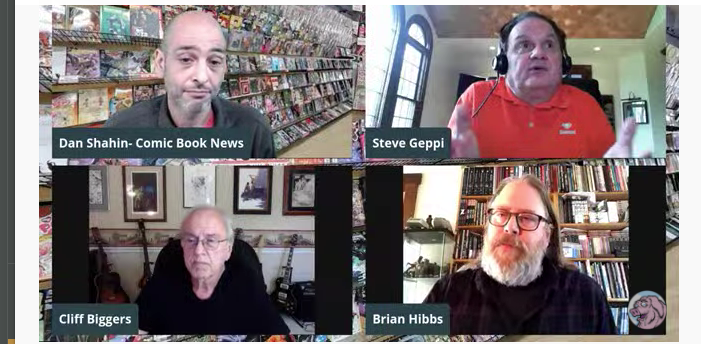
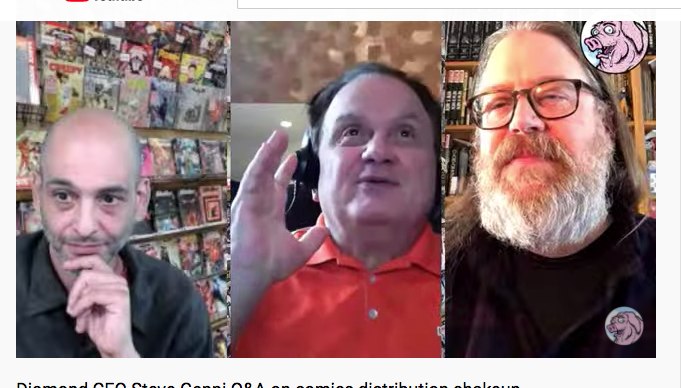
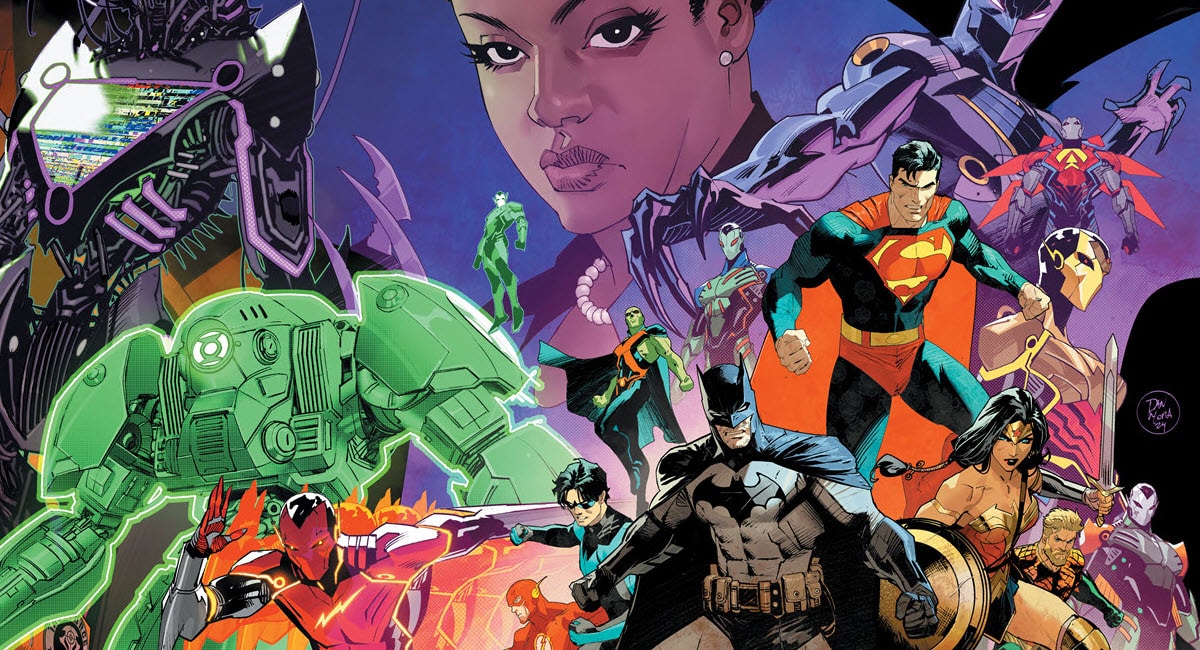
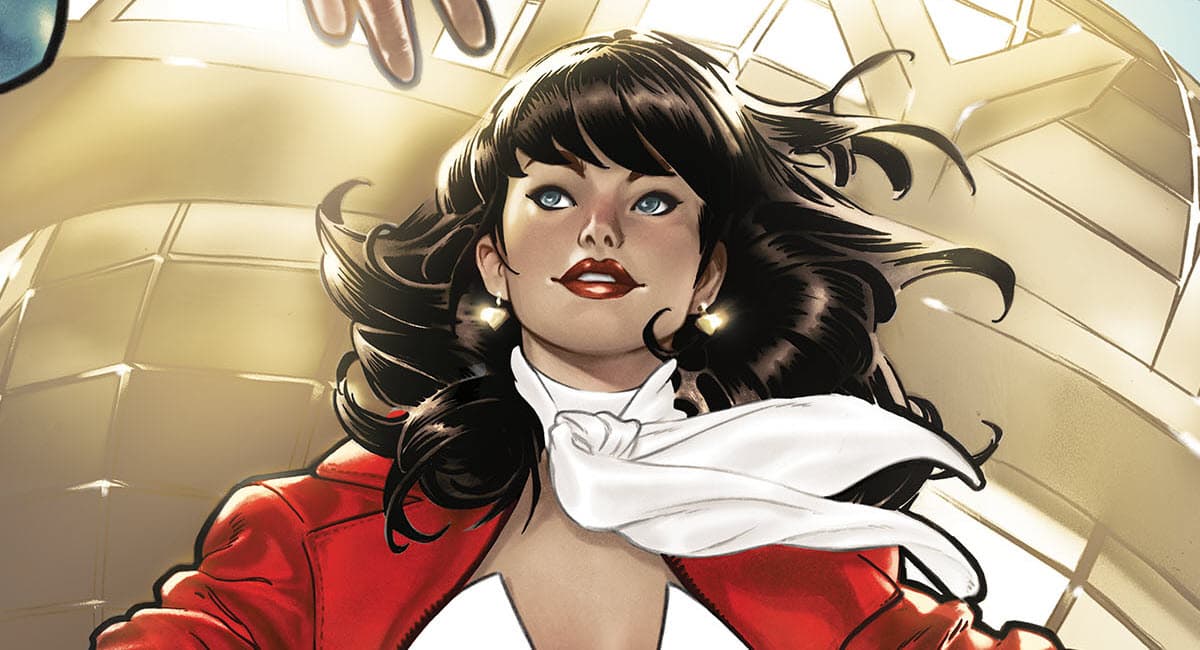
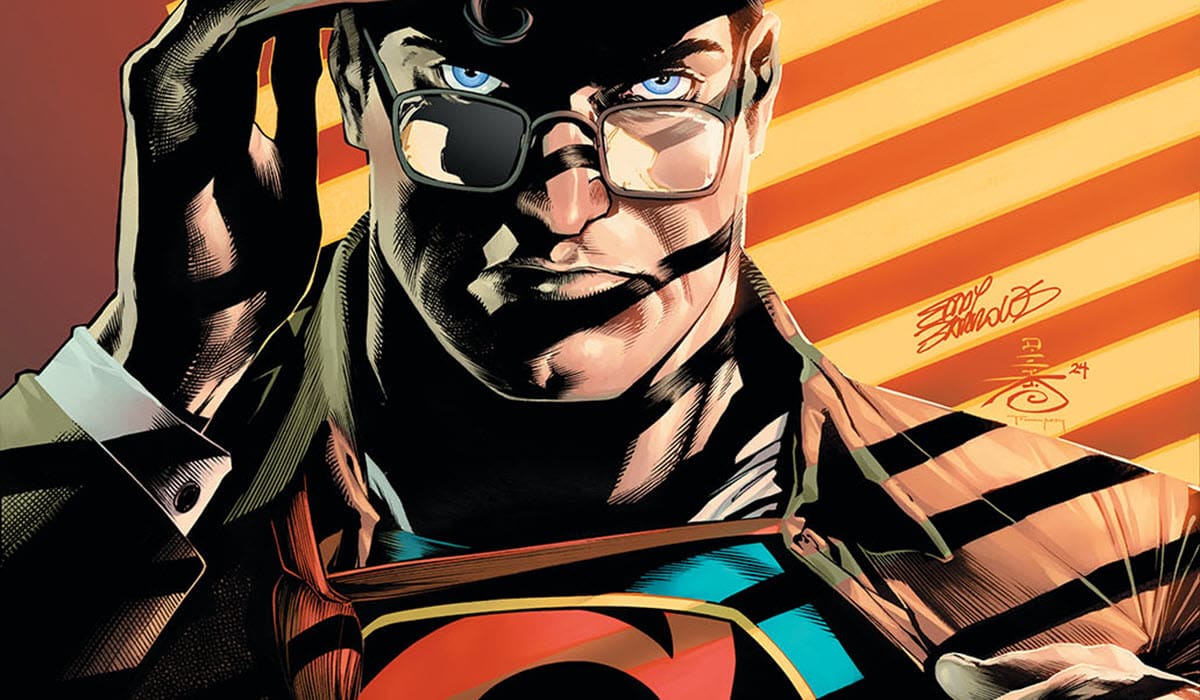



Challenge accepted
Thanks for watching and covering this story!
unfortunately, they’ve been working on destroying the industry for a lot longer than two months.
Mike
Thanks for the write up! I’ve lived through enough disasters. I know the survivors will all be stronger and smarter coming out of this one. It’s time to let the demand side start spinning up the market again.
Enoyable interview. Geppi is interesting and likable.
Comments are closed.